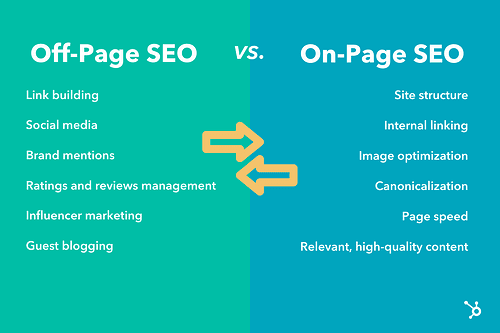Raising a website’s search engine rankings is essential since doing so will enhance traffic to your site. These ideas are essential and are now referred to as SEO. In order for a website to grow and improve, it has to have strong on-page SEO.
You can use SEO services to optimize your website which affects your search engine rankings and overall website readability. You must first understand how off-page SEO differs from on-page SEO.
Table of Contents
- What is Off page SEO?
- Why Off page SEO is important?
- How Off page SEO is different from ON page SEO
- Off-Page SEO Best practices
- Conclusion
What is Off page SEO?
Off-page SEO is a group of procedures carried out outside of your website to raise its standing in search engine results. External factors determine how high your business ranks in search results. These elements also let search engines know that readers will find value in your material. The amount and quality of backlinks going to your website are the major factors in off-page SEO. Generating generic content is the first step to obtaining quality links and enhancing off-page SEO. Your company may next concentrate on boosting the quantity and caliber of backlinks, which elevates your position in search results.
You have much more control over on-page eCommerce SEO, but it’s important to keep off-page SEO in mind as well – you need both to be successful. On-page and off-page SEO are equally important and effective in improving your website’s search engine optimization. If you want your site to operate as effectively as possible, using both tactics is the best course of action.
Why Off page SEO is important?
Off-page SEO is used to boost a website’s popularity. Off-page optimization increases the ranking of your site thanks to other sites. Search engine optimization (SEO) measures that are not performed on your own pages are part of off-page optimization. Important elements of external optimization:
1. Creating links. Link building should be the centerpiece of your offsite SEO activities. Based on the links to your content, search engines determine its quality. A website with reliable links will consequently rank better in search results. Natural links, manually generated links, and self-created links are the three basic types of links in off-page SEO.
2. Social signals. Social networking sites by themselves do not affect your search engine rankings. However, they directly connect us with our customers and audiences. The material you publish on social media or the links you share with your audience through social media, on the other hand, will benefit you in search engines. because if your audience shares your link, you’ll get more visitors.
3. PR, reputation and brand management. When it comes to off-page optimization, you should also mention PR, marketing or brand management. Google prefers rated companies that act as influencers or influencers. This indicates that strong brands are more likely to achieve good positions in the SERPs.
How Off page SEO is different from ON page SEO
On-page SEO and off-page SEO are the two subcategories of your search engine optimization plan. Both are essential to an SEO campaign’s success, yet they work in fundamentally different ways to raise your search engine ranks. To differentiate between the two, you must have a basic grasp of search engine algorithms. Search engines generally look for two sorts of material when comparing your website to other websites on the Internet:
● On page SEO: what is your site about?
● Off-page SEO: how authoritative is your site? How popular is it?
Generally speaking, on-page variables mostly decide what you rank for, while off-page factors largely influence how high you rank in search results.
Off-Page SEO Best practices
Creating a great product or service, posting on popular, relevant blogs, building engagement with influencers, getting positive reviews and responding to negative ones, and tracking mentions of your brand are all Off-Page SEO best practices.
● Create a product or service that will be 10 times better. If your product or your services are recognized as the best in their segment, solving SEO tasks becomes much easier. This is because consumers actively debate the benefits of the brand and different goods online and offline, which attracts visitors to your website, generates favorable evaluations on outside sources and boosts sales as a consequence.
● Ensure active interaction with the audience on social networks. Social media should become an invaluable component of your Off-Page SEO strategy. Be active on social media. If you have a profile, be sure someone is keeping an eye on it and can guarantee prompt responses to queries. Be as verbal as a live being. On the Internet, people expect real interaction, not standard responses from robots or constant brand advertising. Be proactive. Utilizing online communities to their fullest potential is the finest thing you can do to raise the credibility of your business. Leave interesting comments on blogs, the topics of which are relevant to your business, without limiting yourself to standard phrases.
● Experiment with content types. When it comes to external SEO, you need to learn to see content beyond the text. Yes, many people are used to the fact that content is words, that is, texts. But as practice shows, text without images leads to ignoring its content, while images are actively perceived.
Conclusion
Off-page optimization is an important part of search engine optimization. In off-page SEO, link building is considered a major success factor. Keep in mind that you also need to stay connected with your audience through various social media platforms. After all, they can help you with your off-page SEO process.

